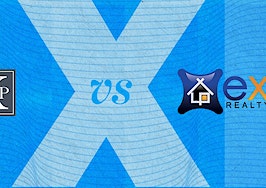EXp Realty is unlike any other brokerage in the industry. Since its founding in 2009, the publicly traded company has seen rapid growth and achieved a billion-dollar valuation — all while eschewing brick-and-mortar facilities in favor of a unique virtual office space. That success has not come without bumps in the road, but the company nevertheless continues its push to expand.
This week, eXp Realty founder and CEO Glenn Sanford hopped on a call with Inman to discuss where he sees his company going in the future, and to preview his comments at the upcoming Inman Connect in Las Vegas, where he’ll be speaking. What follows is a version of that conversation that has been lightly edited for length and clarity.
Inman: We’re coming up on the 1-year anniversary of your VirBELA acquisition. Talk to me about how that’s gone and how you guys have beefed up the virtual world over the ensuing months since that acquisition.
Sanford: So we acquired them in November of last year. So it’s been about seven months, not quite a year. But that being said, we’ve certainly expanded our development team there. We’re doing some stuff with WebVR which is quite interesting. We’ve got a lot of stuff going on with lots of different clients outside of real estate. The U.S. Navy, Stanford Business School, and then there’s some stuff in the e-commerce space.
And the thing we’re most excited about, once we finished the acquisition, is we created the VirBELA Open Campus, which is actually available for anybody to use, to go and have meetings. We created a new product there called Team Rooms, which is kind of an alternative to something like maybe a Zoom, but an always-on space for teams and folks to be able to have a private space without having to invest thousands of dollars a month. They can do a small mini space inside of our larger space for a small amount.
So that’s been an exciting additional piece. Of course, with eXp we’re continuing to expand our board rooms, our training center. Our auditorium just grew by three or four X. So we’re now positioned to be able to have meetings with over 1,000 people attending as avatars. Which we think is pretty cool given that prior to VirBELA and our acquisition the largest virtual world for business was somewhere around 150 to 200 simultaneous users. So we’re well above any of the other venture-backed companies that have evolved virtual worlds for business.
You mentioned that there are some other organizations in different industries that are using this as well. The U.S. Navy for example, or Stanford Business School. Talk to me about how they’re using it.
Ironically, back a few years ago, I think 2016, we recognized what was going on in the virtual world business space and a lot of the companies had dropped out of the game. And the platform we were on back then was using some chrome plugins and some different flash-based environments and those were going away. So we actually looked at the education space and saw what was being done in virtual worlds for education, and that’s how we discovered VirBELA.
So we went and took a platform that was originally developed for education and universities and then actually adapted it to real estate. We went and found them. They weren’t looking for us. And then we quickly became their largest single user.
But it’s used by the Honor Foundation, which does training for veterans that are coming from overseas to get integrated into local activities. The Navy is using it primarily for simulations. It’s the same underlying engine that runs our eXp world, but they’re using it to actually simulate and reproduce the type of training environment that used to cost a million and a half to two million dollars to set up. And they’re able to do it on less than $100,000 using some of the virtual reality stuff that VirBELA has developed.
So it’s kind of interesting how we’re kind of a leader in remote work because of the way we use the virtual campus.
I’m wondering if providing virtual worlds for other organizations is a significant part of your bottom line. Is that a secondary business that you run now?
It absolutely is a secondary business. We’re investing in it not just for eXp Realty’s benefit, but for other verticals that we think could benefit from the technology. And talking to companies that could displace or reduce their brick and mortar overhead significantly. We’ve talked to one client who spends over $10 million a year just on an office, and they could replace that same infrastructure for under $1 million per year.
We think that over time, it’ll be a big business for us. Right now it’s still a very small percentage of the overall business but we think it’s a good business to grow into so we’re not just a residential real estate brokerage. We would be multifaceted.
Any idea what percentage it might become. Is it going to become half your business or 10 percent or 90 percent? Where will it be?
In terms of percentage of business, we’re probably looking at something in the range of 10 percent to 15 percent of the business on a longer term basis. And we’re talking three, four years out. It’s still very speculative on our part.
But it’s a high-margin business, whereas residential real estate is low margin business. Becoming a [software-as-a-service] player, especially with a technology that could be widely adopted, could be a good additional business to be in. Maybe it can generate $50 or $100 or $200 million a year. It may have closer to 50 percent margins, versus residential real estate, which is pretty darn thin.
Do you guys think you may offer it to other real estate companies?
That part we keep really to ourselves. The Team Room product is available for teams that want to play with the environment, but outside of the Team Room, the enterprise platforms are for businesses outside of residential real estate.
Earlier this year, Gary Keller made some kind of critical comments about the platform. I think he compared it to Pac Man and Donkey Kong. Presumably you disagree with those comments, but I’m curious how you respond. What specifically, in your opinion, might he have gotten wrong?
Well, ironically Donkey Kong was one of the the most popular games of all time and still has a significant place in the Nintendo ecosystem. So it’s interesting that he compared us to some of the best games ever.
But I think the reality is that — and Gary said this, we didn’t say this — but he mentioned that he had signed a [non-disclosure agreement] and tried to buy the platform and quote-unquote bid the price up. So, obviously, he liked the platform well enough to try to make an offer and buy it. And he realizes how much of an enabling technology it is. Otherwise he wouldn’t have tried to buy it, either for his own use or to try to put eXp out of business.
I think the reality is that if he’s talking about it, he obviously sees it as a threat. We know how empowering the platform is. And we think it truly is the reason why we’ve been able to build a scaleable business without having any physical bricks and mortar. I work from a home office. The entire leadership team works home office. Four hundred and thirty-plus employees all work remote, plus all of our agents, and we’re all connected through this quote-unquote Donkey Kong platform. I think Donkey Kong is pretty good.
You recently hit 20,000 agents if I recall…
Today!
Okay, congrats! That made me wonder, where do you see your agent count going? How big do you want to get and when do you want to get there?
It’s kind of interesting. Back in 2012, I sat with Stefan Swanepoel and we talked a little bit about where we want to go. And Jason Gesing and I talked about hitting 10,000 agents by 2020. And now if we just do the math on how fast we’re going, we’ll be three times what we originally projected in 2012 for 2020.
We haven’t really focused on agent count, what we do is we focus on the agent value proposition. And with that we think it’s kind of like a Field of Dreams exercise: If we build it right, agents will show up.
And so we look at the idea that if we’re growing, we’re obviously doing something right. If we’re not growing we need to make some changes. And right now it seems like we’re doing the right stuff and if we look out five years from now we should have 100,000 agents on the eXp platform. Just based on the math we’ve watched over the last number of years.
So that’s five times what we’re at right now, but we should be that pretty easily. With 50 percent year-over-year growth for the next 5 years, that would take us well past 100,000 agents, and we’ve been growing more than that for the last four years.
In the past, agents have received equity. Is that still the case and if so how much equity do new agents get?
Yep. It’s a fundamental part of why we are a public company. So all of our agents receive a small amount of equity from the basic activities they do. For the first transaction each year, they get $200 of equity. When they cap, meaning they pay the $16,000 in company dollars, they get $400 worth of stock. When they attract an agent to eXp, when they do their first transaction, they get another $400 worth of stock.
We have an ICON Agent program for the top 2 percent of agents in the industry that are with us where they can actually get their cap back in the form of equity. All of those are effectively on a three-year vest. And then we have the first stock comp plan for real estate agents where they can get a 20 percent discount on their stock.
We think that those programs will stay for quite some time. They are a valuable part of the model. We think it’s actually one of our big differentiators, the fact that all of our agents are shoulder-to-shoulder shareholders with everybody else.
You guys recently announced you’re expanding into New York City. Obviously that’s a very unique market and I’ve seen some observers debating how well your model will work there. Tell me how you’re going to build up a long-term strategy that works for the specific conditions in New York City.
I think we’re going to do just fine there. Our goal is not to be Corcoran or Compass or Douglas Elliman. It should be a fundamentally great place for agents to hang their licenses and build their business based on the agent’s brand, rather than it being a corporate brand. I think that there’s still a population of agents in New York City where eXp is going to resonate really well, and I think there are going to be agents that need to be at those other brands because they really require that to be competitive.
So we don’t know how big it’ll get. Right now we’re 1 percent or 1.5 percent of all the agents in the United States. So what’s 1 percent of the agent base in New York City? I don’t know what that number is. A few hundred agents. A couple thousand agents. I think that’s totally doable and we’ll see where we go from there.
You mentioned that your approach may appeal to some kinds of agents and not so much to others. What do you see as the profile of the agent, specifically in New York City, that might want to join you?
The type of agent that likes to go out and build their own book of business. There are agents in every market where they don’t feel strong enough to go out on their own so they need a shingle to give them personal credibility to go out and talk to consumers. You have other agents who have a big enough brand, and they’re strong enough as individuals, that they can do as much business as they want to do. And it’s really more of how can they build a brand on top of the brand.
So when you think of the major brands that are out there, you don’t really hear much about the agents that work for them. Whereas at eXp, we’re all about putting the agent first. And that’s really I think going to be the differentiator. We can attract some of the big agents who are doing big volume. And if we get enough of them, all of a sudden we could be a player.
Again, we’ll see how it goes. It may take us six months, it may take us two years, it may take us four or five years. But we’ll figure it out.
You’re going to be speaking at Inman Connect coming up here, and my understanding is you’re going to talk about building a virtual company in real estate. Talk to me a little bit about what you’re going to share. What points do you want to hit for that audience?
The key that I think is really important for anybody who is an entrepreneurial broker-owner type — meaning they’re a glutton for punishment and they’re willing to go down the path of building a brokerage, mainly probably indie brokers more than any other group — is to figure out what truly is going to separate you from the bulk of the brokerages that exist in your market.
I’m going to talk about how I think blockchain is going to be a big differentiator over the next three, four, five years. I think that’s a big one. I think the use of VR, not in the way we’re using it in the virtual world — though that’s one way — but the use of VR whether it be the Matterport home tours, the EyeSpy 360 or what have you.
I think the key is, figure out what it is you’re going to own as your unique selling proposition and do that over a long enough period of time and you’ll be able to create something that’s scaleable and profitable.
How do you stay ahead in a changing market? Inman Connect Las Vegas — featuring 250+ experts from across the industry sharing insight and tactics to navigate threat and seize opportunity in tomorrow’s real estate market. Join more than 4,000 top producers, brokers and industry leaders to network and discover what’s next, July 23-26 at the Aria Resort. Hurry! Tickets are going fast, register today!
Thinking of bringing your team? There are special onsite perks and discounts when you buy tickets together. Contact us to find out more.







